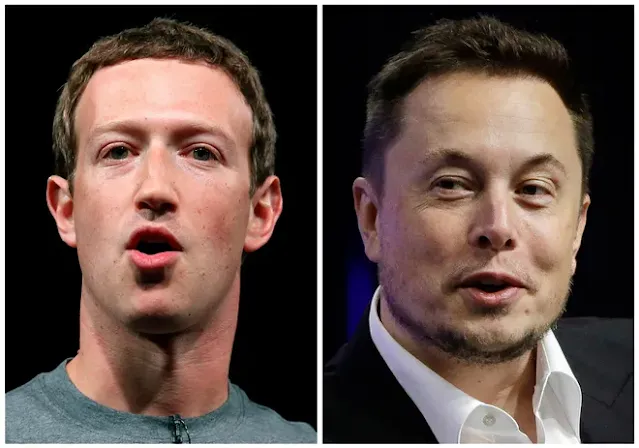In the realm of technology and innovation, clashes between prominent figures often make headlines, capturing the attention of the world. The recent verbal sparring between Andrew Tate, Elon Musk, and Mark Zuckerberg has sent shockwaves through the industry. In this article, we delve into the details of this captivating rivalry, exploring the motivations, arguments, and implications behind the clash of these tech titans. Join us as we unravel the dynamics of this high-stakes showdown and its potential impact on the future of technology.
Setting the Stage: Andrew Tate's Bold Claims
Andrew Tate, a controversial figure known for his outspoken views, has recently made bold claims targeting Elon Musk and Mark Zuckerberg. Through his social media presence, Tate has launched scathing criticisms, questioning their business practices, leadership styles, and overall impact on society. These provocations have sparked a heated debate within the tech community and beyond, pitting Tate against two of the most influential figures in the industry.
Elon Musk: Visionary Entrepreneur Pushing Boundaries
Elon Musk, the enigmatic entrepreneur behind Tesla, SpaceX, and various other ventures, is renowned for his audacious goals and relentless pursuit of technological advancements. With a strong focus on sustainable energy and space exploration, Musk has garnered a massive following and has become a household name. His innovative ideas and charismatic persona have garnered admiration, but also attracted scrutiny and controversy along the way.
Mark Zuckerberg: Architect of Social Media Dominance
Mark Zuckerberg, the co-founder of Facebook, has reshaped the way people connect and share information globally. As the head of one of the largest social media platforms, Zuckerberg has wielded immense influence over the digital landscape. However, Facebook's impact on privacy, misinformation, and the spread of harmful content has drawn criticism, placing Zuckerberg in the crosshairs of public scrutiny.
The Clash of Ideologies and Ambitions
The clash between Tate, Musk, and Zuckerberg represents more than just a battle of egos. It reflects a clash of ideologies, ambitions, and visions for the future of technology. Each figure has carved out their own path, championing their unique philosophies and approaches. While Tate challenges the status quo and questions the intentions of these tech giants, Musk and Zuckerberg continue to drive innovation and disrupt industries, albeit with varying levels of public approval.
Implications for the Future of Technology and Society
This clash of tech titans holds implications for the future of technology and its impact on society. It raises questions about the role of big tech companies, their responsibility towards users and society, and the influence they wield over our daily lives. The outcome of this rivalry could potentially shape the trajectory of technological advancements, privacy regulations, and the balance of power within the industry.
Andrew Tate's Provocations and Criticisms:
Andrew Tate has been vocal in his criticism of Elon Musk and Mark Zuckerberg, raising concerns about their business practices, ethical implications, and societal impact. Tate argues that these tech giants have amassed disproportionate power and influence, creating monopolistic environments that stifle competition and harm smaller players in the industry. He questions the motives behind their philanthropic efforts, suggesting that they may be driven more by personal gain and PR strategies rather than genuine altruism.
Elon Musk's Visionary Defense:
Elon Musk, known for his visionary pursuits and groundbreaking innovations, has responded to Tate's criticisms by highlighting the transformative impact of his ventures. Musk argues that his ambitious projects, such as electric vehicles and space exploration, are essential for tackling pressing global challenges, including climate change and the future of humanity beyond Earth. He emphasizes the need for bold action and disruptive thinking to drive progress, defending his companies' practices as necessary for pushing the boundaries of technology.
Mark Zuckerberg's Defense of Connectivity:
Mark Zuckerberg has defended Facebook's mission to connect people and create a global community. He acknowledges the challenges faced by the platform, particularly in handling issues related to privacy, misinformation, and content moderation. Zuckerberg argues that Facebook's efforts to address these concerns are ongoing, and he envisions a future where technology enables positive social interactions and empowers individuals and communities.
Public and Expert Reactions:
The clash between Tate, Musk, and Zuckerberg has ignited passionate responses from the public and industry experts alike. Supporters of Tate's viewpoints argue for stricter regulations and increased accountability for tech giants, while supporters of Musk and Zuckerberg emphasize the transformative potential of their innovations. Debates surrounding the concentration of power, data privacy, and the ethical responsibilities of technology companies have gained renewed attention, prompting discussions on how to strike a balance between innovation and societal well-being.
The Road Ahead:
As the clash between Andrew Tate, Elon Musk, and Mark Zuckerberg continues to unfold, it will undoubtedly shape the future trajectory of the tech industry. Public scrutiny, government interventions, and advancements in technology itself will play crucial roles in determining how these titans navigate the challenges ahead. The clash serves as a reminder that the impact of technology extends far beyond individual companies or personalities; it shapes our lives, societies, and the future of humanity itself.
A Clash that Redefines Technology's Role in Society
The clash between Andrew Tate, Elon Musk, and Mark Zuckerberg represents a pivotal moment in the evolution of technology and its impact on society. It challenges us to critically examine the practices, motivations, and consequences of tech giants while envisioning a future that harnesses the potential of innovation for the betterment of humanity. By engaging in thoughtful dialogue, addressing societal concerns, and driving positive change, the tech industry can evolve in a way that benefits individuals, communities, and the world at large.













0 Comments:
Post a Comment